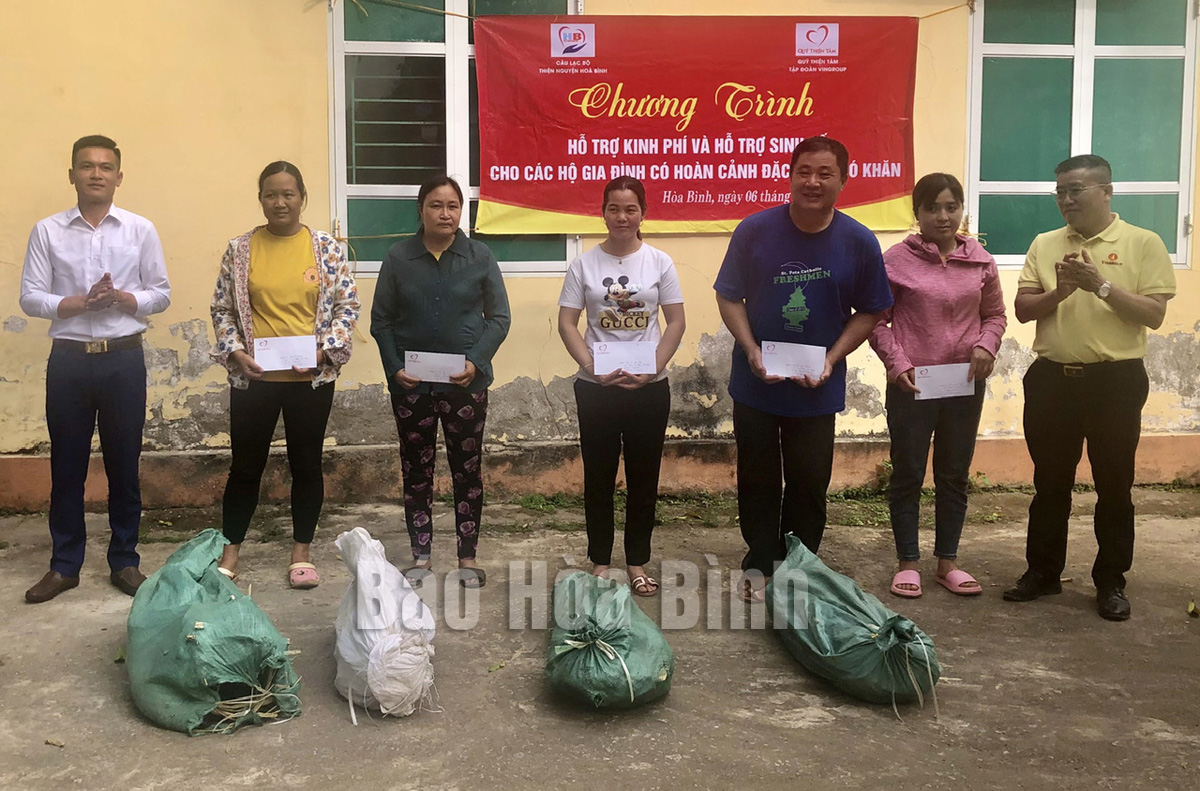
(HBO) – Ethnic households in Mai Chau district have had better livelihoods and incomes thanks to support from local authorities and organisations. In Tong Dau commune, people were given a high-quality rice variety to grow in a pilot area of 4 ha. Seeing positive results of the pilot programme, last year, local farmers expanded the cultivation area using this rice variety.

Meanwhile,
in Cun Pheo commune, the district’s Red Cross Association and other organisation
gave people young animals for raising.
People
in other communes of Mai Ha, Son Thuy, Bao La, and Xam Xoe were also provided
with seeds, young animals, and medicinal plants.
With
funding from the National Target Programme for Socio-economic Development in
Ethnic Minority and Mountainous Areas, Mai Chau district People's Committee
supported each household in Bao hamlet 3 million VND to buy seeds. The
committee coordinated with the GNI organisation to open training courses on
livestock raising techniques, and assisted local residents in the establishment
and operation of the Muong Pa cooperative that specialises in raising and
supplying indigenous pork.
From
17 members, the cooperative now has nearly 50 members. The cooperative’s pork
is sold in Hanoi and neighbouring provinces, bringing stable income to the
cooperative’s members.
According to Ngan Van Toan, deputy head of the district's Department of
Agriculture and Rural Development, programmes and policies to support ethnic
minorities and ethnic minorities have been effectively implemented.
Initial results show that the support helped to increase production value,
income and improve people's living standards.
Ha Van Hai, head of the district's Ethnic Group Affairs Section said that the
district is home to many ethnic groups with the Thai people accounting for
nearly 60% of the district’s population and the Muong 16.6%.
Over
the past time, the district has focused on implementing Resolution No. 03-NQ/TU
of the provincial Party Committee on socio-economic development in ethnic
groups and mountainous areas from 2021 to 2030.
One of
its key tasks is to develop ethnic groups and mountainous areas in association
with economic restructuring, contributing to stabilizing and improving the
people's living standards.
The
Mai Chau district Party Committee has directed agencies, departments, sectors,
and mass organisations to strengthen coordination, and effectively combine
poverty reduction efforts with the implementation of the two national target
programmes on sustainable poverty reduction and new-style rural area
construction.
The
district also supports ethnic group people with social security policies and
vocational training programmes for rural workers.
Such
support not only contributes to improving the lives of ethnic people but also
helps the district to meet the criteria of new-style rural area construction
and step up sustainable poverty reduction in ethnic minority areas.
The
district strives to reduce the poverty rate in ethnic group areas by 3-4% yearly
until 2030./.
More than just an information technology teacher, Bui Van Nien is an inspiring figure who has nurtured the scientific curiosity and creative spirit of students in Vietnam’s ethnic minority communities.
Da Bac is the most disadvantaged mountainous district in Hoa Binh province, with ethnic minorities accounting for about 90% of its population. Over the past years, the district has mobilised resources to implement ethnic policies to improve the quality of life of local people.
In recent years, Hoa Binh province has consistently prioritised the protection, care, and education of children, particularly those from ethnic minorities and disadvantaged backgrounds, by creating a safe, healthy, and nurturing environment for their all-round development.
The Steering Committee for Tobacco Harm Prevention and Control of Hoa Binh province, in coordination with the Tobacco Harm Prevention and Control Fund, held a ceremony on May 28 in response to the World No Tobacco Day (May 31) and the National No Tobacco Week (from May 25 to 31). The event was chaired by Nguyen Van Toan, Standing Vice Chairman of the provincial People’s Committee and head of the Steering Committee.
Since 2021, the Center for Industrial Promotion and Industrial Development Consulting (CIIDC) under the Department of Industry and Trade has been implementing a school lighting model as part of the plan for using energy efficiently and economically in Hoa Binh Province in the pẻiod of 2021 - 2025. This model not only aims to improve the learning conditions and enhance the education quality, but it also promotes the message of energy saving, energy security, environmental protection and contributes to the goals of socio-economic development.
In the 2024 - 2025 school year, the entire Hoa Binh provincial education sector includes 520 educational institutions and schools. Among them are 13 ethnic boarding schools with 153 classes and 4,487 students. Four of these schools have met national standards, reaching 30.7 percent.



